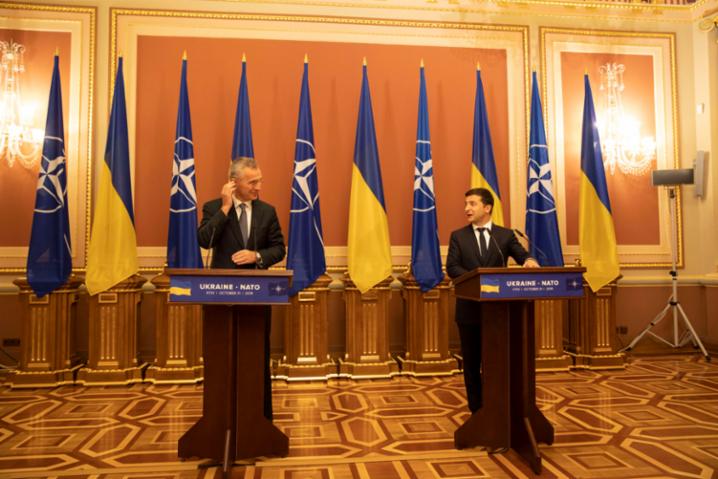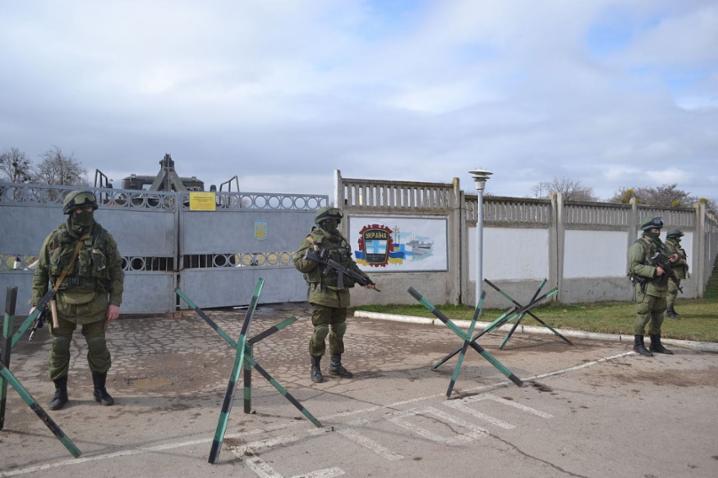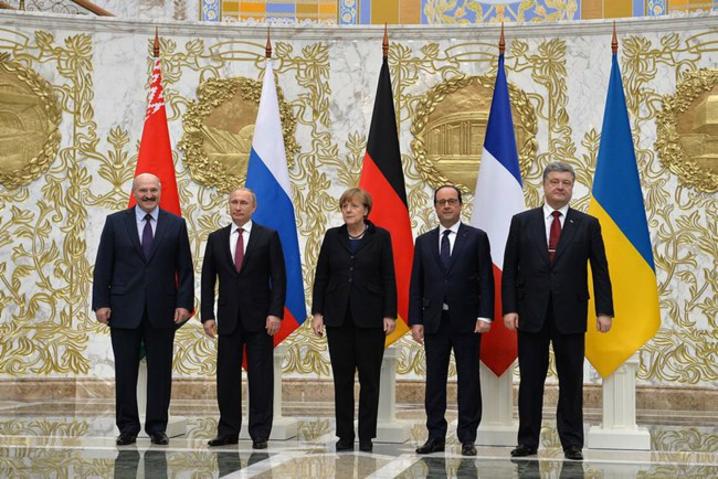Russia’s aggressive actions against Ukraine have seriously undermined Euro-Atlantic security. Ukraine has engaged constructively towards a settlement. But the key for the normalisation of relations between NATO, Russia and Ukraine remains Russia’s recognition of Ukraine’s sovereignty, independence and territorial integrity. Sanctions relief in the absence of significant moves would undermine the West’s credibility and risk further destabilisation.
Six years have passed since Russia illegally annexed Crimea, an integral part of Ukraine’s territory. This was the first time since the end of the Second World War that a country in Europe tried to change borders by force. This gross violation of international law was followed by Russia’s destabilisation of eastern Ukraine, where it has supported militants in waging war with Ukrainian forces and sent its own troops. In response, NATO has firmly supported Ukraine’s sovereignty and territorial integrity. It launched the biggest reinforcement of its collective defence since the end of the Cold War. It suspended cooperation with Russia, while remaining open to dialogue. Western nations also imposed sanctions on Moscow.
Is this still the right approach?
There are voices in the West advocating for new pragmatism in dealing with Moscow.1 Some may be doing so out of an interest to return to normal business relations with Russia. Some may be motivated by an understandable concern about the risks posed by the reinforced military activity. Others may believe that compromises are necessary because Russia is needed to resolve many other challenges and crises facing global security.
But can these objectives outweigh the need to support Ukraine’s sovereignty and territorial integrity?

The visit of the North Atlantic Council to Ukraine on 30 and 31 October 2019, demonstrated the unwavering support of NATO and all Allies for Ukraine. Pictured: Joint press conference by NATO Secretary General Jens Stoltenberg and the President of Ukraine, Volodymyr Zelenskyy. © NATO
NATO Allies have been very clear that they continue to believe that a partnership with Russia, based on the respect for international law and commitments, would be of strategic value. But they cannot and will not compromise on the principles on which the Alliance and security in Europe and North America rests. Russia voluntarily subscribed to the rules-based security order that has served well as the foundation of security in Europe. This order – which has included among other documents the Helsinki Final Act, the Charter of Paris and the NATO-Russia Founding Act – aims to benefit all countries in Europe, based on the principle of sovereign equality and the indivisibility of security. It is neither hostile to Russia nor obsolete.
Russia’s obvious desire to pursue its security interests through a delineation of spheres of influence among major powers is totally unacceptable. It would bear tremendous risks for European security. Ukraine’s sovereignty and integrity is at the heart of the rules-based European order. Its security interests must be fully taken into account.
Ukraine’s battle for independence
The security challenges posed by Russia’s assertiveness are crystalised in Ukraine’s battle for independence. For centuries, the Ukrainians found themselves under the rule of outside powers. An overwhelming majority of its citizens supported independence in a referendum in December 1991 (92.3 per cent voted in favour with a turnout of 84 per cent). Independence was internationally recognised shortly after, including by Russia.
Ukraine, which had inherited the third-largest nuclear arsenal in the world, joined the Non-Proliferation Treaty as a non-nuclear weapon state in 1994. In support of this, Russia, along with the United States and the United Kingdom – later joined by China and France – gave security assurances to Ukraine as part of the Budapest Memorandum. This included respect for Ukraine’s independence, sovereignty and existing borders.
In 1995, Russia and Ukraine mutually agreed to divide the Soviet Black Sea Fleet among themselves. This was followed by an agreement on the continued presence of the Russian Fleet in Ukraine’s Crimea. In 1997, Russia and Ukraine then signed a Treaty on Friendship, called at the time the “Big Treaty”. The signing of the NATO-Russia Founding Act and the NATO-Ukraine Charter on a Distinctive Partnership in the same year further adds to the historical context. It seemed that Ukraine’s sovereignty and independence had been successfully embedded in an international framework, based on the respect of international law.
For some time, Ukraine sought additional securities by pursuing a “multi-vector policy”. Having pursued the goal of NATO membership after 2002, a “non-bloc status” was introduced when Viktor Yanukovych became President in 2010. Together with the Russian President, Dmitry Medvedev, he signed the Kharkiv Treaty in April 2010, which extended the presence of the Russian Navy in Crimea until 2042, in exchange for cheaper Russian gas deliveries. Flourishing corruption gave Moscow further opportunities to influence the Ukrainian state during these years. Meanwhile, to please the large pro-Western parts of the Ukrainian society, Yanukovych continued to officially pursue deeper integration with the European Union.
The “multi-vector policy” started collapsing like a house of cards when Russia coerced Ukraine to abandon the Association Agreement with the European Union in 2013, by putting up trade barriers against Ukraine, in particular, later also by offering Ukraine a loan as a carrot. Mass protests on Kyiv’s Maidan Square started when Yanukovych acquiesced, which marked the beginning of the end of his presidency. By encouraging him to use force against peaceful protestors, Moscow further contributed to his fall.2
Through its military invasion in Crimea, Russia then sought to regain the initiative. The Russian President Vladimir Putin seized the opportunity to take control of the strategically important peninsula and to boost his popularity at home. As Putin revealed in a documentary3 a year later, the decision was taken in his inner circle immediately after Yanukovych’s flight to Russia. The political realities on the peninsula, played no role. No major political force in Crimea, which had an autonomy status within Ukraine, had been advocating independence or unification with Russia. No threat to the Russian-speaking population existed.
The victims of Russia’s actions were Ukraine’s territorial integrity and the Euro-Atlantic rules-based order. Ukraine’s policy to address its security dilemma by accommodating Russian interests, while keeping the European card, had collapsed. The seriousness of the Russian threat to Ukraine became even more apparent with its aggressive actions in eastern Ukraine. These actions showed that Moscow’s objectives went far beyond some possible territorial claims. Nothing less than Ukrainian sovereignty and independence has been at stake in the war in Donbas, which has already claimed more than 13,000 lives.
At first, the Kremlin may have seen an opportunity to break the Ukrainian state by propagating a concept of “Novorossiya” (“New Russia”) in relation to Ukraine’s southern and eastern regions. When this failed, Russia perpetuated the conflict in Donbas to destabilise Ukraine as well as to undermine the government in Kyiv and Ukraine’s prospects of European and Euro-Atlantic integration. Ironically, Russia’s aggressive actions were probably the very reason why popular support in Ukraine for EU and NATO membership climbed to unprecedented levels during this time.4
Targeted sanctions
In response to Russia’s aggressive actions against Ukraine, Western nations imposed sanctions on Moscow. Even though sanctions have been extended many times, some continue to criticise them. Allegations that they are illegitimate or ineffective are however groundless.

The appearance of unidentified soldiers (‘little green men’) in Crimea was a prelude to Russia's illegal annexation of Crimea on 18 March 2014, and its hybrid war in the Donbas, eastern Ukraine.
Sanctions are a legitimate countermeasure against Russia’s violations of international law, while avoiding any further military escalation. They were carefully designed to target members of the Russian elite responsible for actions undermining or threatening the territorial integrity, sovereignty and independence of Ukraine. They also put stress on Russia’s long-term development in the oil, gas and banking sectors, in particular, to press the Russian leadership to change course. They do not target the Russian population directly. This is clearly a measured response. By comparison, it may be argued that Russian counter-sanctions, such as the total ban of food imports from the European Union, have had more immediate implications on ordinary people on both sides.
There is positive evidence that sanctions have had an effect. With very few exceptions states have abided by United Nations General Assembly Resolution 68/262, which in March 2014 called upon all states, international organisations and specialised agencies not to recognise any alteration of the status of Crimea. And economic sanctions are a necessary means to hold Russia accountable to its commitments under the Minsk Agreements, which it is trying to elude.
Sanctions relief in the absence of significant moves on the part of Russia would seriously undermine the West’s credibility. It would not contribute to a resolution of the conflict but risks destabilising Ukraine even further.
Russia’s intransigence
Russia is a party to the Minsk Agreements and as such it bears significant responsibility for their implementation. Without Russian support, the so-called “people’s republics” in Donetsk and Luhansk, would quickly collapse. They pose the main obstacle for a settlement. It is well known that their “representatives” have no intention whatsoever to reintegrate into Ukraine.5
Moscow has been persistent in its efforts to blur its direct involvement in the conflict by forcing Ukraine into direct formal relations with its proxies and to reintegrate the disputed areas into Ukraine with special status. While “special status” is mentioned in the Minsk Agreements, a settlement that would undermine Ukraine’s sovereignty and independence would clearly run counter to their very purpose.6 Contrary to that, the Kremlin is persistent in its refusal to even discuss any prospects of reinstating Ukraine’s control over its part of the border.
Point 10 of the Package of Measures (“Minsk II”) – which provides for the withdrawal of foreign armed formations, military equipment as well as mercenaries from the territory of Ukraine is not discussed either – as Russia continues to deny its presence in Donbas and its constant deliveries of weapons and equipment to the militants. Ceasefire violations, including with banned heavy weapons continue. The OSCE Special Monitoring Mission continues to be heavily restricted by the Russia-backed militants.
Moreover, while Russia is pressing Ukraine to proceed with the political track of the Minsk Agreements, it is promoting the de-facto integration of the non-recognised “people’s republics” into the Russian Federation – notably by introducing the Russian rouble and massively handing out Russian passports to the local population.
Strategic patience and support
Allies have consistently called for their full implementation by all sides. While Ukraine certainly has work to do under the Minsk Agreements, Kyiv has made painstaking efforts towards their implementation. In line with President Poroshenko’s commitment, legislation on “special status” and amnesty was adopted. It is ready to be implemented once the security situation allows. Discussions started on the prospects of local elections in Donbas.

After 16-hour talks, the leaders of Belarus, Russia, Germany, France and Ukraine – (left to right) Alexander Lukashenko, Vladimir Putin, Angela Merkel, Francois Hollande and Petro Poroshenko – agreed a new ceasefire deal for eastern Ukraine in the Belarusian capital Minsk, on 12 February 2015. (A previous Minsk ceasefire deal collapsed within days of its signing on 5 September 2014.) © Wikipedia
President Zelenskyy as well has made peace in the East a priority and has taken on responsibility. In his inaugural speech in May 2019, he stated: “We are not the ones who started this war. But we are the ones who have to finish it.” Since then, he has made efforts to focus on the human factor and to win back the hearts and minds of the people in the conflict zone. He agreed to the disengagement of troops in three pilot zones. Despite much public resistance in Ukraine, in October 2019, he accepted the so-called “Steinmeier formula” – proposed by German President Frank-Walter Steinmeier back in 2016 when he was foreign minister – which provides for the implementation of the “special status” in certain areas of Donbas following local elections there under Ukrainian legislation and international monitoring.
Clearly, the fight for independence remains Ukraine’s national task. It is up to Ukrainians to decide how to restore territorial integrity without undermining sovereignty and independence. Ukrainians need and must be able to decide their own future. They have made it clear that they wish to live in a prosperous and peaceful country, firmly anchored among European democracies committed to common values. In the future, the majority sees the country in the European Union and NATO.
The fight for Ukraine’s independence has an internal dimension, which is not less important than the external one. For decades, lack of structural reforms, corruption, vested interests and poor rule of law have weakened Ukraine’s prospects for development and resilience against hybrid attacks. They are also the result of a lack of strategic orientation of its leadership for too many years.
Some may still believe that Ukraine can have a “bridge function” between Russia and the West. But following events in Ukraine and elsewhere, the key for the normalisation of relations between NATO, Russia and Ukraine remains Russia’s unequivocal recognition of Ukraine’s sovereignty, independence and territorial integrity. The key for a settlement of the conflict in eastern Ukraine lies with Moscow.
Beyond that, the fact that Russia has expanded its aggressive behavior to other areas of the world and started a series of hybrid attacks on Western countries, leaves little ground for any normalisation of NATO-Russia relations. For this to happen, a clear, constructive change in Russia’s actions would be required that demonstrates compliance with international law and its international obligations and responsibilities. Clearly, this should start with a change in Russia’s behaviour vis-à-vis Ukraine. Strategic patience will be necessary, until Moscow is ready to support a lasting solution.
Ukraine continues to be in need of Western support.
